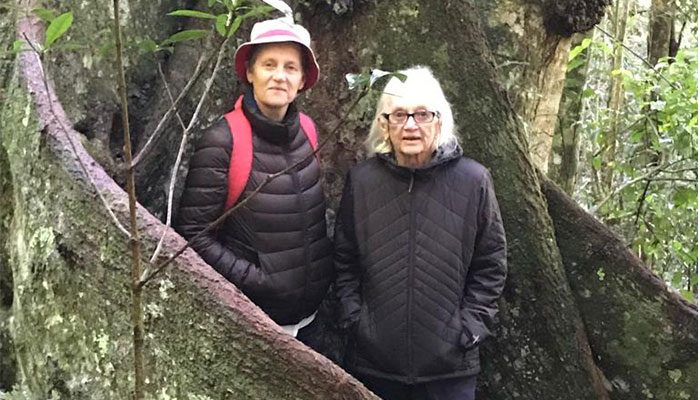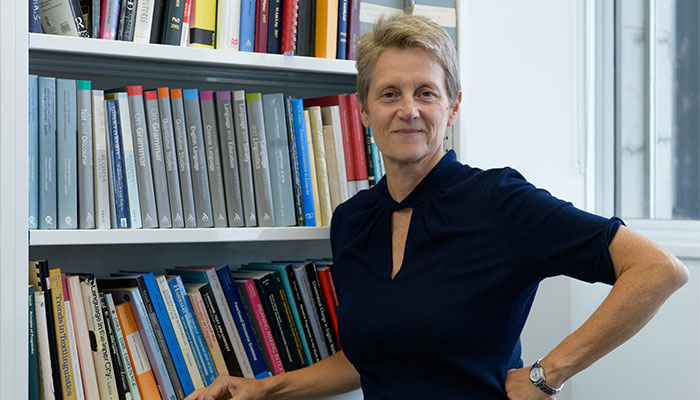My beautiful mother has Alzheimer’s. The warning signs came in conversational breakdowns ... in her struggles to find words, in her fragmentary and vague utterances.

Familiar ground: Associate Professor Annabelle Lukin (pictured with her mum) recommends bite-sized, familar topics when in conversation with loved ones with Alzheimer's.
I’ve lived in a different state from my mum for 30 years, so I’ve always needed the phone to stay in touch. As her Alzheimer’s worsened, she moved to a nursing home, and then COVID-19 and border closures arrived. Telephone conversations were now my only option.
With more than 20 years of teaching and researching linguistics, I knew I could use the many great insights from linguistics to help me navigate this new challenge.
One of the most valuable things linguistics taught me is that language is not simply an information delivery service. As important as this role of language is, we actually learn to use language to connect with those around us well before we learn to use it to talk about stuff.
Dr Annabelle Lukin uses this video of the Talking Twins in her lectures to demonstrate how conversation is about more than words. Credit: YouTube.
I show my students the Talking Twins of YouTube fame to explain this principle. The twins, around 18 months old, reveal the pleasure there is in connecting and sharing with others through conversation, without communicating a single word of content meaning. They take turns in the conversation, they share a connection, they smile and laugh.
Let’s not infantalise the elderly. I don’t talk to my mum like she’s a child. The point is that language has a lot going for it, even when its information function doesn’t work very well any more. Conversations do need content – this is all part of the machinery of language.
Inside is a person struggling to hold herself together, and trying her best to play her part in our conversation. So I listen carefully, and strive to turn the words she offers into a good next step in our conversation.
Steer toward bite-sized topics
These days, when I call my mum, I have to find suitable topics for our phone catch-ups. Mostly I stay on familiar ground: how the grandkids are doing; how work is going; what the weather is like; and when I will next be seeing her. These need to be bite-sized topics that can hold her in the remnants of memory so she stays connected.
But the content itself is now secondary – its role now is to get a conversation going, so that my mum gets the chance to be a conversational partner. I typically lead the conversational dance with my mum, creating opportunities along the way for her to chime in: ‘That’s lovely’; ‘How nice!’; ‘You must be so pleased’; ‘I’ll look forward to that’.
And when she ventures her own topic, I have to step up to try to fill out what it missing. I have to listen harder to what she says, and reach for the most likely meaning she is trying to communicate.
Her words are not random. They are often vague and fragmented, but never a ‘word salad’. Inside is a person struggling to hold herself together, and trying her best to play her part in our conversation. So I listen carefully, and strive to turn the words she offers into a good next step in our conversation.
For example, when the Queen died, I explained to her that her son Charles was now the King of Australia. What she said back to me was disjointed, but so very clear in its intention. Mum’s republican heart was not yet a casualty of her dementia. ‘Australia’ ... my mum was trying to say, 'Isn’t it time we moved on?’.
After months of phone calls, something else became very clear to me. Even when she couldn’t remember my name, the sound of my voice was clearly so familiar. It created an instant connection.
I also realised how important it was to use my voice to signal what I was doing as her conversational partner, and, by extension, using my voice to help light her way. What linguists call ‘phonology’. It's the very important rising and falling patterns in our speech, which could give my mum key conversational clues.
It could tell her whether the topic was something ordinary, or surprising. It could signal that I was still holding the floor, and when I had wound up my turn. These important signals give her the best chance to make a plausible contribution to our interaction.
The gift of conversation
Much of our interaction is punctuated by her constant repetition, and she sounds like the proverbial broken record. A very popular question for my mum – I hear it several times in a single conversation – is, ‘When will I see you?’. And every time I patiently answer this question, I think of another important thing that linguistics taught me: Interaction is a gift.
In fact, one of my favourite linguists, M.A.K. Halliday, argues that interaction is like ‘potlatch’, a traditional native American gift-giving ceremony. But interaction, Halliday wrote, is a really special kind of gift: while greatly enriching the recipient, it does not in the slightest degree diminish the giver.
Every time I indulge my mum by letting her ask me the same question over and over, I am giving her conversational agency. What I mean is, she gets to start a topic of conversation. She gets to lead our conversational dance. This is one of the greatest gifts you can give someone with dementia.

Associate Professor Annabelle Lukin, pictured, emphasises the importance of giving your loved one conversational agency when communicating with them.
Though conversation is now much harder for my mum, it is no less important to her self-identity. And, with a little bit of help from linguistics, I’ve adapted to become the conversational partner my mum now needs. Small changes. With beautiful rewards.
Dr Annabelle Lukin is an Associate Professor, Department of Linguistics, at Macquarie University.



